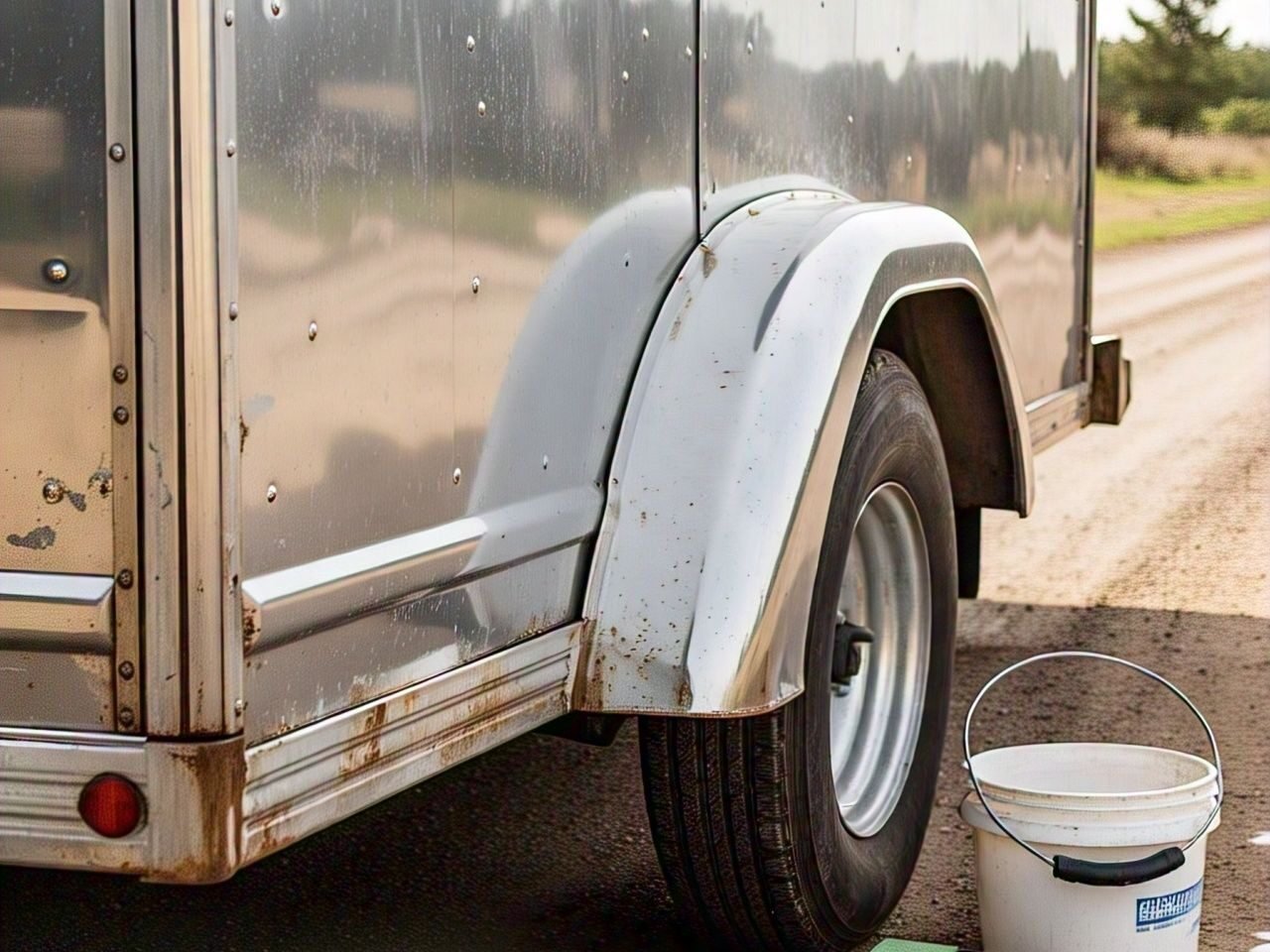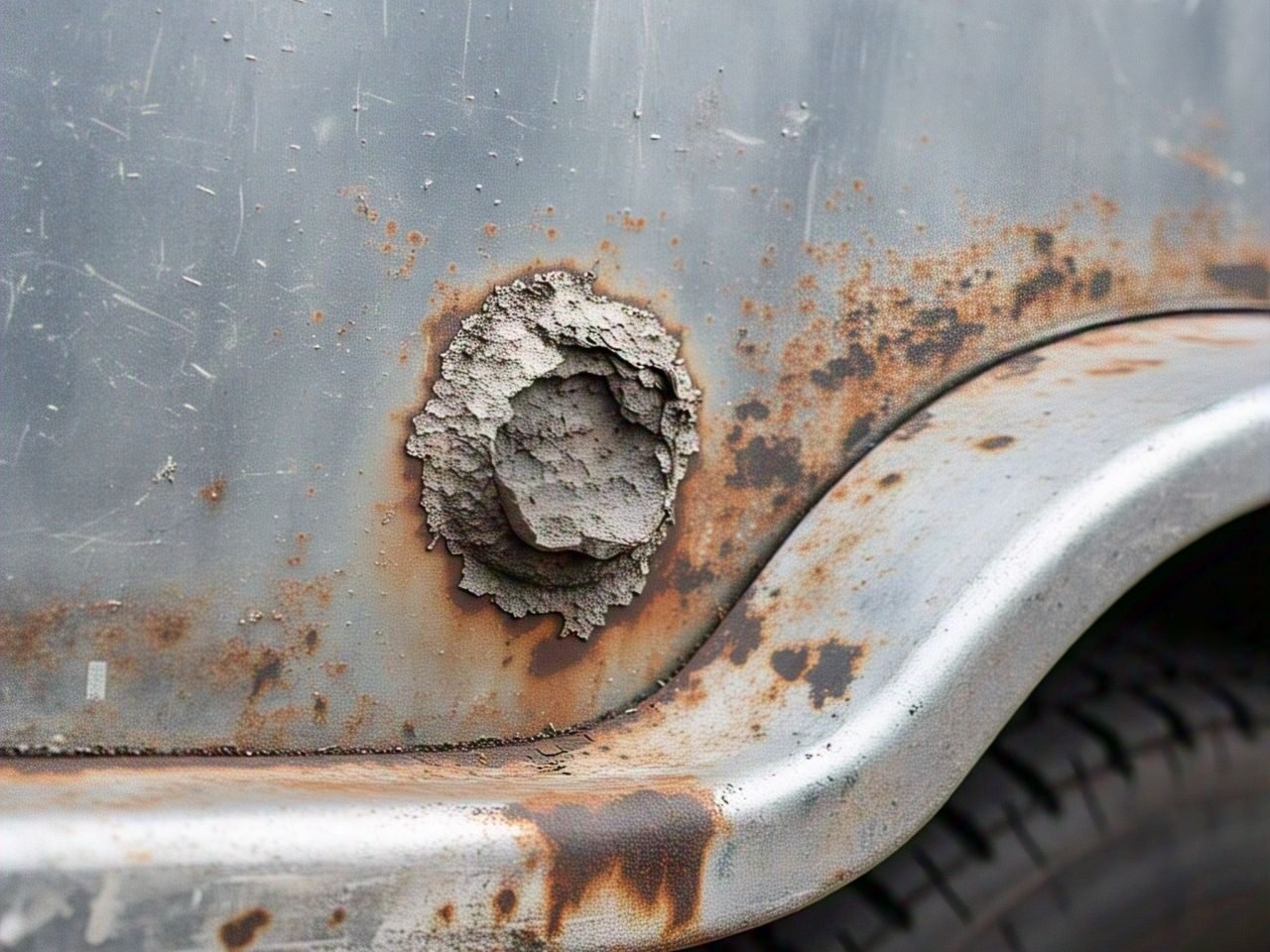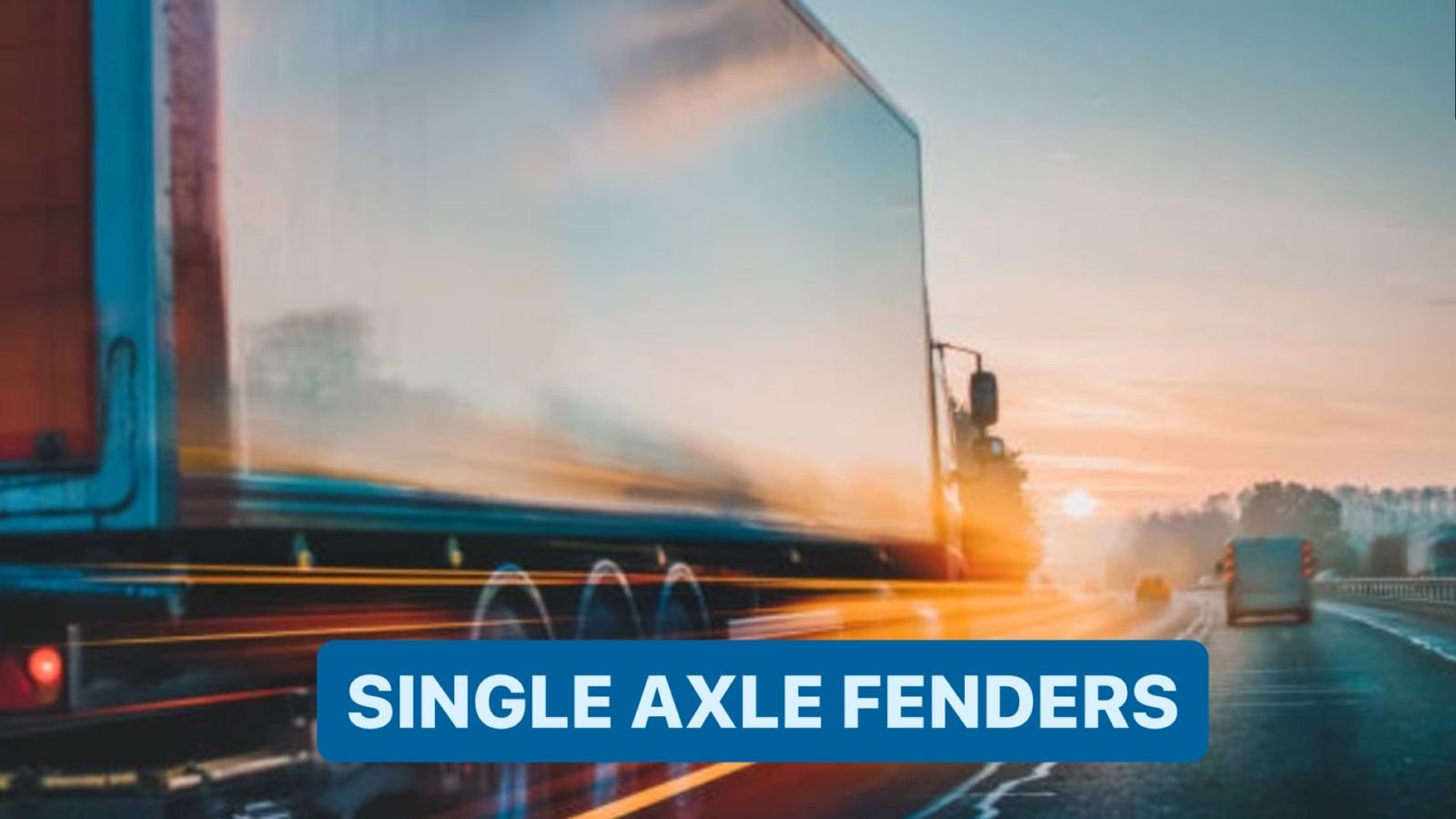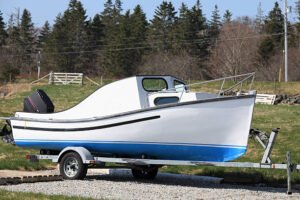Single axle fenders may seem like a small part of your trailer, but they’re actually crucial for protecting your trailer, keeping it looking great, and preventing damage. Picture this: you’re hauling a load down a gravel road or through rough terrain. Without a fender, all that debris like rocks and mud kicks up against your trailer’s body and possibly the tires and underside, causing unnecessary wear and tear.
Not only that, but single axle fenders help keep other drivers on the road safe. By blocking road debris, they reduce the risk of rocks or mud flinging up and hitting nearby vehicles. If you’ve ever had to deal with chipped paint, cracked lights, or scuffs on your trailer, you know the value of having proper fenders.
Unlike tandem fenders (designed for trailers with two or more axles), single axle fenders are made specifically for trailers with only one axle, meaning one wheel on each side.
In this guide, we’ll walk you through everything you need to know about single axle fenders, starting with different materials, their pros and cons, and how each type performs in various conditions.
What Exactly Are Single Axle Fenders?
Before diving into materials and styles, let’s start with the basics: what are single axle fenders? In short, these are protective covers placed above each wheel on a single axle trailer. They’re there to shield your trailer and tires from road debris, mud, and minor impacts. Besides protecting your trailer, fenders also enhance its appearance, giving it a more polished, complete look.
Single axle fenders are commonly found on trailers used for light-to-medium loads, like utility trailers, boat trailers, and sometimes even smaller campers. By covering each wheel, single axle fenders keep your trailer protected and add some aesthetic value. Plus, having a well-fitted fender can increase your trailer’s resale value because it shows you’ve taken care of it.
Here’s another article you will like.
Types of Single Axle Fenders (Categorized by Material)
Choosing the right fender involves more than just finding something that fits. The material of your fender determines its durability, weight, weather resistance, and even how much maintenance it requires. Below are some popular materials, along with their pros, cons, and ideal uses.
1. Steel Fenders
They are the go-to choice if you need a fender that can withstand rough conditions and heavy-duty use. These fenders are known for their strength and durability, making them ideal for trailers used on rugged terrain or those carrying heavy loads.
Steel fenders are heavier than most other materials, which can be a downside if you’re looking to reduce the overall weight of your trailer. However, if durability and strength are your priorities, steel is a great choice.
Pros: Strong, impact-resistant, excellent for heavy-duty use
Cons: Heavier than other materials, can rust if untreated
2. Aluminum Fenders
Aluminium fenders are ideal for those who need a lighter option that still provides good durability. Aluminium is corrosion-resistant, making it a smart choice for trailers exposed to water, such as boat trailers or trailers used in coastal areas. Aluminum fenders tend to cost a bit more than steel or plastic, but they’re lightweight and require minimal maintenance, especially when exposed to moisture.
While they don’t offer the same level of impact resistance as steel, they’re still a solid choice for general use, especially if you want to keep the weight of your trailer down.
Pros: Lightweight, corrosion-resistant, suitable for wet conditions
Cons: Higher cost, less impact-resistant than steel
3. Plastic Fenders
Plastic fenders are made from heavy-duty polymers and are an affordable, corrosion-resistant option. They’re incredibly lightweight and easy to install, making them a popular choice for utility trailers and moderate-use trailers. Plastic fenders are also available in various colors and styles, so they’re a good choice if you’re looking to match your trailer’s aesthetics.
However, plastic isn’t as durable as metal, so it’s better suited for lighter-duty applications. They can crack under heavy impact, so if you need a fender for rough terrain or off-road conditions, this may not be the best choice.
Pros: Affordable, corrosion-resistant, lightweight, available in different styles
Cons: Less durable under heavy impact, may crack over time
4. Galvanized Fenders
Galvanized fenders are steel fenders coated with a layer of zinc, which prevents rust and makes them ideal for wet conditions. These fenders are perfect for boat trailers or trailers that will frequently be exposed to rain or snow. They’re just as strong as steel but offer enhanced rust protection.
Galvanized fenders tend to be more expensive than standard steel but provide long-term value by withstanding corrosion and wear. While they’re a bit heavier than aluminum or plastic, their durability makes them a great investment.
Pros: Rust-resistant, strong, ideal for trailers in wet or coastal areas
Cons: Higher cost, may still require occasional maintenance
5. Fiberglass Fenders
Fiberglass fenders offer a unique advantage: they’re highly customizable and lightweight. They’re a popular option if you’re looking for a sleek, aesthetic look, and they come in a variety of shapes and designs. Fiberglass is also weather-resistant, so it can stand up well against the elements.
However, fiberglass isn’t as impact-resistant as metal options, so it may crack if hit hard. It’s best for trailers used on smoother roads and for those who value style along with function.
Pros: Lightweight, customizable, weather-resistant, stylish
Cons: Higher cost, less durable under impact
| Fender Material | Strength | Corrosion Resistance | Weight | Idea use | Cost |
| Steel | High | Low | Heavy | Heavy-duty, rugged conditions | Moderate |
| Aluminium | Moderate | High | Light | Wet environment, light use | High |
| Plastic | Moderate | High | Very Light | Light-to-moderate use | Low |
| Galvanized Steel | High | Very High | Heavy | WetCoastal Environments | High |
| Fiberglass | Moderate | Moderate | Light | Smooth roads, aesthetic appeal | High |
Getting the Perfect Size for Your Trailer’s Needs
Fender should cover the entire tire
Selecting the correct size fender for your single axle trailer is essential for both appearance and function. The fender should cover the entire tire and align just above the wheel, leaving enough clearance to prevent it from rubbing against the tire. Getting the size right not only looks better but also ensures your trailer stays protected from road debris, gravel, and mud that could otherwise damage the trailer’s body.
Measure the diameter of your tire
To find the right size, you’ll want to measure the diameter of your tire, along with its width. Most single axle fenders list the tire sizes they fit with, making it easy to find one that matches your setup. Remember, it’s better to choose a fender slightly larger than your tire if you’re in doubt. This way, you won’t have to worry about clearance issues, especially when your trailer is loaded or on rough terrain.
🚚 Types of Trailer Fenders: Find the Perfect Fit!
➡️ Round Fenders
- Best for: Heavy loads or off-road trailers.
- Features: Curved design that evenly distributes force, offering strong impact resistance.
- Ideal for: Utility trailers and boat trailers where durability is key.
Check an amazing discount on amazon.
➡️ Teardrop Fenders
- Best for: Trailers that focus on aesthetics.
- Features: Sleek, rounded front and tapered back for a streamlined look.
- Bonus: Slightly reduces drag, helping with fuel efficiency.
- Ideal for: Classic-style or custom trailers.
➡️ Square (Jeep-Style) Fenders
- Best for: Trailers needing extra functionality or storage.
- Features: Flat tops that can hold brackets, steps, or storage spaces.
- Ideal for: Camping trailers or heavy-duty haulers.
Selecting the right shape depends on your priorities. If you’re after durability, round fenders are a good option. If style and customization are important, consider teardrop or square shapes.
Installation Tips for Single Axle Fenders
Installing your fenders correctly is crucial to ensuring they stay secure and perform well. Proper installation prevents rattling, helps avoid accidents, and extends the fender’s lifespan.
Essential Installation Steps
Choose the Right Hardware
↓
Use corrosion-resistant bolts and screws:
- Stainless steel
- Galvanized options
↓
Ensure durability, especially in wet conditions.
Align the Fender Properly
↓
Position fender evenly above the tire:
- Maintain a few inches of clearance.
- Follow the tire’s curve closely.
↓
Prevent rubbing during trailer movement.
Secure Tightly and Check Often
↓
Use a power drill or wrench to tighten bolts:
- Ensure everything is snug.
↓
Test the trailer with the fender installed: - Inspect fenders regularly, especially after bumpy trips.
Essential Maintenance Tips for Long-Lasting Single Axle Fenders
Taking care of your single axle fenders is key to keeping your trailer in top condition. With regular maintenance, you’ll get more life out of your fenders, save money in the long run, and avoid issues like rust or cracks that could harm your trailer. Here’s how you can keep your fenders in great shape for years.
1. Clean Regularly to Prevent Dirt Buildup
Dust, mud, and grime can quickly build up on fenders, especially if you’re often on rough roads or take your trailer through wet environments. Start by giving your fenders a quick rinse with water after every trip to remove surface dirt. Every few weeks, use a mild detergent to scrub the fenders down.

For those who haul in coastal areas, be mindful of salt buildup, as it can lead to corrosion, especially on metal fenders. In this case, a more frequent rinse with freshwater can make a big difference.
2. Inspect for Rust, Cracks, or Dents
Taking a few minutes to check your fenders for any signs of rust, cracks, or dents can save you from bigger issues down the road.
If you have steel or galvanized fenders, look for rust spots and address them with a rust remover or rust-proof paint to prevent further corrosion.

In the case of dents on steel fenders, you might be able to hammer them out, but always check that the fender remains aligned with the wheel to ensure it’s providing proper protection.
3. Tighten Loose Bolts and Hardware
Vibration and movement can cause bolts and screws to loosen over time. If a fender becomes loose, it can rattle, shift, or even come off completely while driving—something no trailer owner wants! Every few trips, give all the mounting hardware a once-over with a wrench. Ensure everything is tight and secure. If you’re frequently on rough terrain, make it a habit to check the hardware more often.
4. Apply a Protective Finish for Extra Durability
If you want to extend the life of metal fenders, consider applying a protective coating or finish. This can include a rust-resistant spray or a clear coat that shields against dirt and weather elements. For plastic or fiberglass fenders, a UV protectant spray is helpful to prevent fading or cracking from sun exposure. This small investment in protective products can significantly extend the life of your fenders.
Where to Buy Quality Single Axle Fenders for Your Trailer
Now that you know how to choose and maintain the best fenders for your trailer, let’s talk about where to find them. Whether you’re looking for high-quality steel, lightweight aluminum, or durable plastic fenders, here are some of the top places to buy single axle fenders.
1. Trailer Supply Stores
Your local trailer supply stores are a fantastic place to start, as they usually stock a variety of fender types and sizes. Visiting a store in person allows you to see the products up close, compare materials, and get professional advice on what type of fender suits your trailer. Staff at these stores can often help you measure for the correct size and answer specific questions about durability and installation.
2. Online Retailers
Online shopping for single axle fenders offers convenience and a wider selection. Major retailers like Amazon, eBay, and trailer-specific websites often stock many brands and styles, from rugged steel fenders to stylish fiberglass options. Look for reputable online sellers with good reviews to ensure you’re getting a quality product. Shopping online also makes it easy to compare prices and find deals that might not be available in-store.
3. Trailer Manufacturers and Authorized Dealers
If you prefer an exact fit or an OEM (Original Equipment Manufacturer) fender, checking with the trailer manufacturer or authorized dealers is a good option. Many manufacturers offer fenders made specifically for their trailers, so you’ll know it fits perfectly. Though buying directly from the manufacturer can sometimes cost more, it ensures compatibility and quality. Plus, you may get a warranty or return policy that adds extra peace of mind.
4. Specialty Off-Road and Boat Supply Shops
For trailers that handle specialized needs, like off-road utility trailers or boat trailers, check out shops that specialize in off-road equipment or marine supplies. These stores often carry heavy-duty or corrosion-resistant fenders, perfect for trailers exposed to rough terrain or salty water. Here, you can find galvanized steel or aluminum fenders specifically made for boat trailers, helping you make a smart choice for your trailer’s unique needs.
5. Used or Salvage Part Suppliers
If you’re looking for a budget-friendly option, consider checking out used parts from salvage suppliers or online marketplaces for secondhand trailer parts. While this route takes a bit more time and effort, you can sometimes find high-quality fenders at a fraction of the cost. Make sure to inspect used fenders thoroughly for signs of wear, rust, or cracks to avoid any issues.
Common Mistakes to Avoid with Single Axle Fenders
When it comes to single axle fenders, even experienced trailer owners can slip up and make avoidable mistakes.
1. Installing Fenders Too High or Low
One of the most frequent mistakes is positioning the fender incorrectly. Fenders should be mounted at just the right height to protect your trailer’s wheels without interfering with tire movement. If they’re mounted too high, they won’t shield the wheels or frame properly from road debris. If they’re too low, they may rub against the tires, which can cause both the tire and the fender to wear out prematurely.
To avoid this, Ensure there’s enough space between the fender and the tire, but not so much that it compromises coverage.
2. Choosing the Wrong Fender Material
While it may be tempting to go for a cheaper fender material, the wrong choice can lead to quick wear and tear.
Before purchasing, consider your trailer’s typical environment and usage. Investing in materials that suit your needs—like aluminum for lightweight durability or stainless steel for corrosion resistance—pays off in the long run.
3. Neglecting Regular Inspections
A lot of trailer owners install their fenders and forget about them until something goes wrong. Skipping regular inspections can lead to loose bolts, unnoticed cracks, or even rust that slowly eats away at the fender.
Make it a habit to inspect your fenders every few months, especially if you frequently haul on rough roads or in harsh conditions.
4. Ignoring Fender Alignment
Proper alignment ensures that your fenders don’t shake or rattle while driving, which can be a huge annoyance. Poor alignment can also lead to fender damage if it shifts too close to the tire.
5. Overlooking Local Regulations and Safety Standards
Believe it or not, there are often specific regulations governing fender size, clearance, and installation, especially for trailers on public roads. Failing to comply with local rules may lead to fines or even cause issues.
Benefits of Investing in High-Quality Single Axle Fenders
Choosing high-quality single axle fenders can seem like an investment upfront, but it brings a ton of value over time. From durability to protection, here’s why it’s worth opting for quality.
1. Long-Lasting Protection for Your Trailer
A high-quality fender provides reliable protection, shielding your trailer and tires from debris, mud, and water. While cheaper fenders may degrade quickly. Investing in quality means you won’t have to constantly replace fenders or worry about them breaking down after a few months of use.
2. Enhanced Safety on the Road
With quality fenders installed, you’re ensuring that other drivers, as well as your trailer, are safe on the road. Durable fenders effectively contain any rocks, debris, or gravel your trailer may kick up, preventing potential damage to nearby vehicles. This added safety aspect is especially important if you’re hauling heavier loads or driving on gravel roads.
3. Boost in Aesthetic Appeal
High-quality fenders not only serve a functional purpose but also improve the overall look of your trailer. Whether you prefer sleek aluminum for a modern look or stainless steel for a rugged, industrial appearance, investing in quality fenders enhances curb appeal.
4. Increased Resale Value
If you ever plan to sell your trailer, high-quality fenders can improve its resale value. Potential buyers often look at the condition of the fenders and other key parts to gauge how well the trailer has been maintained. .
5. Lower Long-Term Costs
Cheap fenders can crack, fade, or rust quickly, meaning you’ll have to replace them sooner than you would a durable, well-made fender. By investing in quality materials from the start, you’re cutting down on future expenses and hassles.
Click to check out this for your single axle fenders.
Frequently Asked Questions about Single Axle Fenders
Q1: What material is best for single axle fenders?
- Steel: Durable for rugged use; prone to rust without maintenance.
- Galvanized Steel: Rust-resistant; good for wet conditions.
- Aluminum: Lightweight, corrosion-resistant.
- Plastic: Cost-effective; limited durability.
- Fiberglass: High-end finish; prone to cracks.
Q2: How do I choose the right fender size?
- Measure tire width and diameter.
- Select a fender slightly larger for full coverage.
Q3: Can I install fenders myself?
- Yes! Position, mark, and secure with bolts. Consult a professional if unsure.
Q4: How often should I inspect fenders?
- Inspect every few months; more frequently for rough terrain.
Q5: Are there special maintenance tips for metal fenders?
- Apply rust-proof coating annually.
- Rinse after exposure to salt or mud.
- Touch up scratches to prevent rust.
Meta Description



